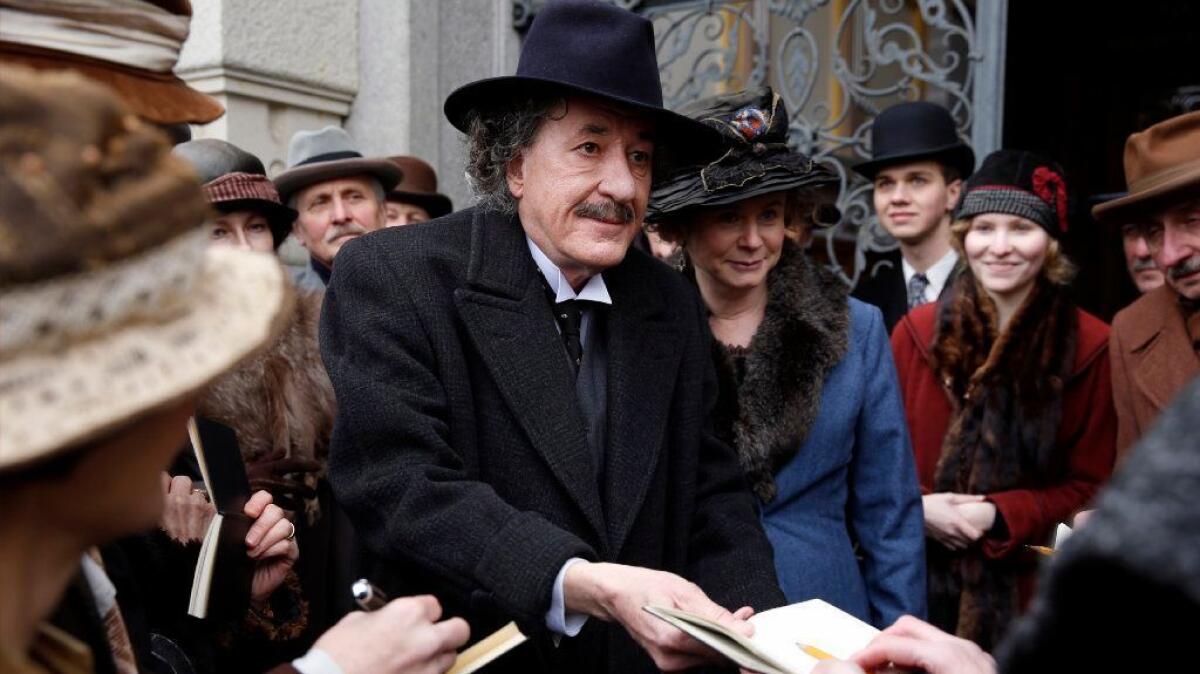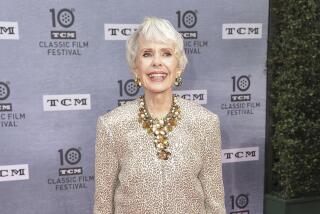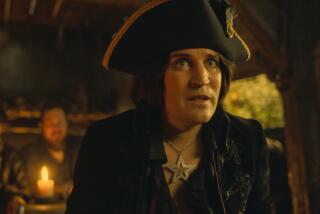A ‘Genius’ Geoffrey Rush talks art, science and emojis

Geoffrey Rush is a man prone to tangents. As he speaks, each of his thoughts leads him to an adjoining thought. This means that, in the course of 30 minutes, the 65-year-old actor muses on everything from the vintage Apple billboards featuring John Lennon to the origins of emojis.
He’s in London to discuss his role as Albert Einstein in National Geographic Channel’s first scripted drama series “Genius,” which premieres Tuesday. But in chatting about the famed physicist, Rush finds his way back to emojis.
“I have great faith in emojis,” the Australian actor says, seated on a sofa in a hotel room overlooking Piccadilly Circus. “When I was doing ‘King Lear’ last year I wanted to take my mind off all the stuff you have to confront in that role.
“I remember texting the stage manager just for fun and I did the whole story in about 50 emojis,” he continues. “I discovered you can get a form and write to the emoji people and say, ‘You’re missing this.’ I think an Einstein emoji would be great. It represents brilliance.” He stops, then adds, “I haven’t sent in a [suggestion] form yet, but I think I might.”
Looking at Rush, it’s easy to see the iconic face of Albert Einstein, especially once a chaotic fop of gray hair is added to his head. In the series, which is told in a nonlinear form with Rush playing the older version of Einstein and Johnny Flynn the younger, Rush embodies the physicist’s intelligence, as well as his humor and jovial spirit. Rush appears in five of the 10 episodes, mostly alongside Emily Watson, who plays his wife (for the third time on-screen, Rush notes). At first Rush wasn’t sure if he wanted to take on someone as revered and notable as Einstein, but then the Oscar winner realized that such opportunities are rare.
“I’m in my 60s now, [roles] are not going to come along like this forever,” he says. “When I read the first script I thought, ‘This is not just about Einstein.’ This has got a central protagonist who is the defining unusual everyperson who is moving through a golden era of scientific discovery. I just liked the epic scale of that. So I treated the story as if it was fictional. The more I read it like that, the more I thought about how everyone was going to identify with its unpredictable quality and the dramatic scale of the life he led.”
Ron Howard, who directed the first episode and executive produces the series along with Brian Grazer, took on the project with Rush specifically in mind for the role. The producer even reworked the schedule to ensure that Rush would be available.
“It’s not just that you can look at Geoffrey and instantly think ‘Einstein,’” Howard says. “It was also his legendary commitment to character development that made him so appealing. We knew we wanted two actors to play the man over the course of his entire life, something Geoffrey had experience doing with his Oscar-winning role in ‘Shine.’”
Howard notes that Rush worked in tandem with Flynn “to develop younger and older versions of behavior, gestures and body language, which they observed from footage of Albert Einstein. It has been very exciting as an actor’s director to work with them to create this one cohesive character.”
At the heart of “Genius” is the idea that it’s essential to ask questions rather than make judgments. Rush, whose manner of speaking suggests that he is constantly considering and reconsidering everything he discusses, related to this sentiment, which he feels is important in the current state of the world. He loves that Einstein looked outward instead of at himself, and continually looked for truth via investigation.
He was so humanistic. From the footage I’ve seen he had the twinkle. You want him on your fictional dinner party list.
— Geoffrey Rush
“In this day and age, for all of his flaws, you just go, ‘He must have been an amazing man,’” Rush says. “He was so humanistic. From the footage I’ve seen he had the twinkle. You want him on your fictional dinner party list. From everything I’d read about him, it wouldn’t be about him. He’d say, ‘So what have you been doing?’ That notion of empathy for what is going on in someone else’s life is nice. We know on the planet right now there’s a lot of indifference for what’s going on in people’s lives with prejudices and misconceptions, so it’s nice to have a figure out there you can look at and know that he asked questions. He didn’t make rigid assumptions.”
Ultimately “Genius” isn’t about convoluted scientific theories. It seeks to look at the life and work of a man who had a complicated story, and who struggled with relationships in the same way as anyone else. “People should not come away from this series going, ‘Oh, I’ll be able to hold court at dinner parties and explain the theory of relativity,’” Rush says with a laugh. “I think you’ve got to go to university and study mathematics and physics for five or six years to do that. But you’ll get an idea of what went into the world that made him a celebrity.”
“Genius” is Rush’s first recurring TV role since the mid-’90s, when he appeared on the Australian series “Mercury.” The Tony-winning actor enjoyed the fast pace of television and especially appreciated spending time developing the same character for a longer period of time, which feels akin to his work in theater. That’s also one of the reasons he keeps setting sail with Disney’s “Pirates of the Caribbean” franchise, which returns with “Pirates of the Caribbean: Dead Men Tell No Tales,” on May 26. His character, Barbossa, rejoins Johnny Depp’s Capt. Jack Sparrow for yet another high seas tale.
“I liked where they went with the sequels because they didn’t try and repeat the first film,” Rush says. “A lot of franchises do that — they try and peg out the same film. I liked the audacity of it going quite operatic. When it came to three, four and five, every time I got sent the script I’d read it and I’d go, ‘Wow, they’ve let this character really evolve.’ He hasn’t – I hope – worn himself out. He was the dark villain in the first one and then he became the politician. And in five, yet again, they dug into more background issues he has.”
He adds, “I like the nature of that ensemble and the global spread of the story. I did a lot of ensemble work in my theater career, being part of a company for three or four years and then part of another company for a few years. It feels like that.”
Rush also has a film about Swiss artist Alberto Giacometti — “Final Portrait,” which was written and directed by Stanley Tucci — coming out later this year. For Rush, the roles of Giacometti and Einstein feel like the right place for him to be at this point in his career. He’s interested in complex men who have created something notable. Although, again, this is a thought that takes Rush on another tangent.
“I have an interest in art and I have an interest in science,” he notes. “I could read those scripts and know I’m really attracted to these characters. It’s very rare that I get to play a cop or anyone on a horse. Which I’ve done and never again! I have a bond with my agent where I go, ‘I don’t do equine.’ If the script says ‘He gallops into the distance’ I say, ‘It’s a pass.’”
“I just can’t go there anymore,” Rush says, shaking his head. “They’re too big and too scary.”
------------
‘Genius’
Where: National Geographic Channel
When: 9 and 10:15 p.m. Tuesday
Rating: TV-14 (may be unsuitable for children under the age of 14)
More to Read
The complete guide to home viewing
Get Screen Gab for everything about the TV shows and streaming movies everyone’s talking about.
You may occasionally receive promotional content from the Los Angeles Times.





